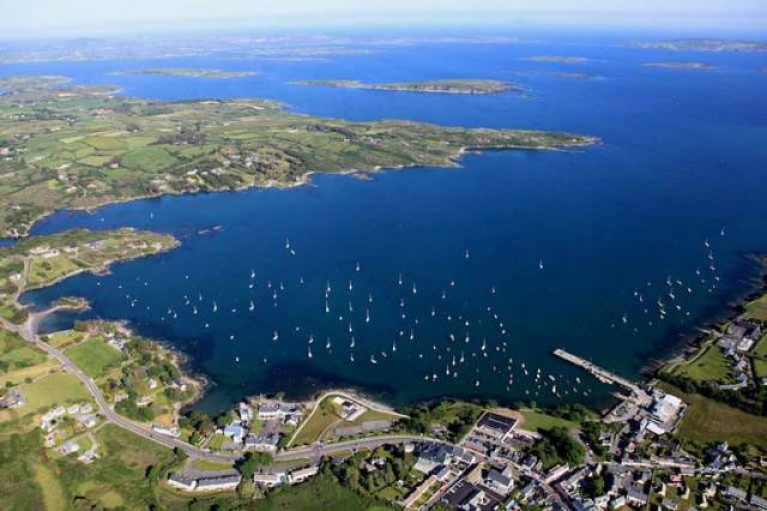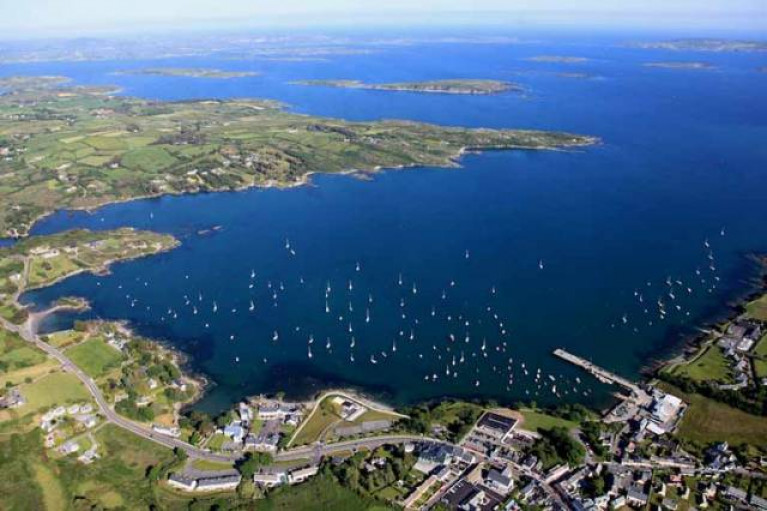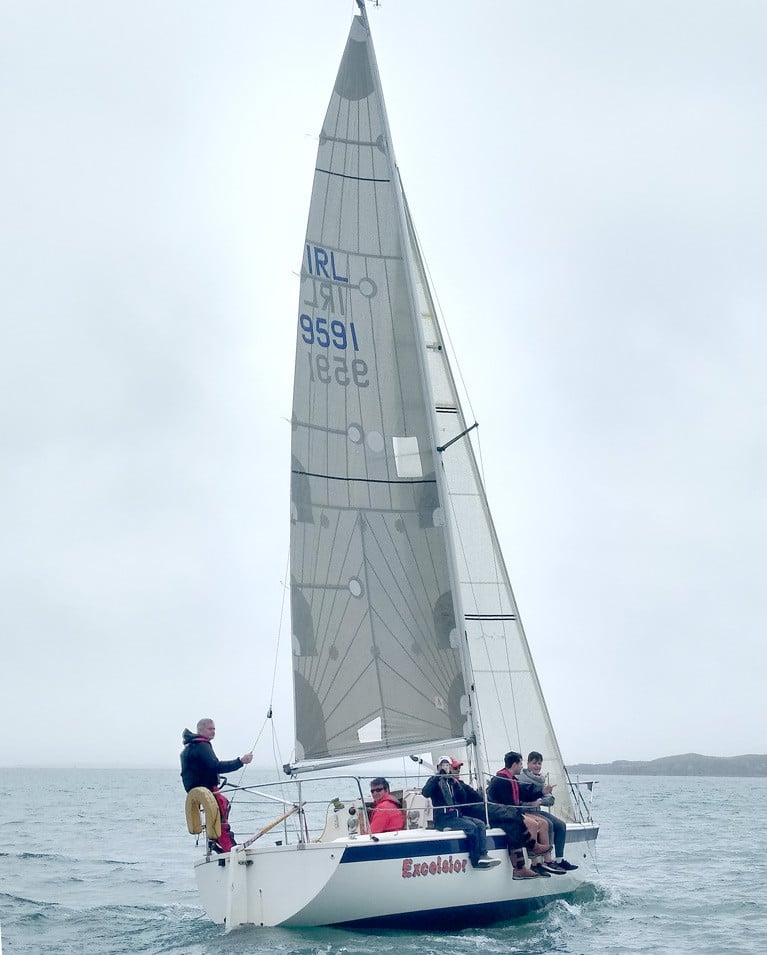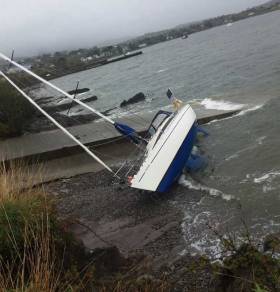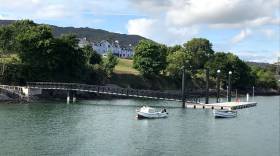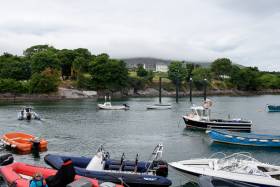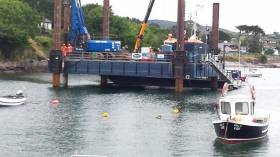Displaying items by tag: Schull
The first West Cork interclub race of the season was staged over the holiday weekend in idyllic conditions.
Starting in Schull Harbour, the ten-boat fleet rounded Western Calf Island and travelled through the Gascanane Sound before finishing off the Wallis Buoy in Baltimore Harbour.
Commodore Peter O Flynn welcomed the competitors to the prizegiving at Baltimore Sailing Club and expressed his delight that the interclub competitions had resumed, having lapsed for a number of years.
 Tony O'Brien's J109 Tighey Boy was a winner on IRC in the Inter Club Schull-Baltimore race Photo: Bob Bateman
Tony O'Brien's J109 Tighey Boy was a winner on IRC in the Inter Club Schull-Baltimore race Photo: Bob Bateman
Schull Harbour Sailing Club commodore Mark Murphy exchanged club pennants with his counterpart and confirmed that the next combined event would be the 3 Square Miles trophy, which will finish on Cape Clear Island on the 22nd of June.
The Eurostyle trophy for Echo was won by the Duggan family on Manzanita, while in IRC, it was another victory for Tony O'Brien, sailing with a large family crew on Tighey Boy.
Schull Harbour Regeneration Plan Directors Mull Over ’Next Actions’ After Expiry of Planning Permission
Directors of the Schull Community Harbour Development Company Limited (SCHDC) say they have met to discuss “next actions” and “continue to consider all options available” following the expiry of planning permission for redevelopment of the West Cork harbour.
In a letter to its supporters, the SCHDC provided a timeline of its efforts over the last 20 years to get the project over the line.
Planning permission was initially granted in 2007, and further extended in 2017, for works that were to include various pier improvements such as an extension and floating pontoon, as well as a 225-berth marina.
However, two separate applications for funding under the Rural Regeneration Fund were unsuccessful, despite what the SCHDC claims was a “commitment that funding would be approved”.
Cork County Council subsequently refused to submit the project for the third tranche of funding, as previously reported on Afloat.ie, instead backing the Dursey Island cable car which itself was unsuccessful in securing funding.
 Schull’s community-procured pontoon was opened to the public in mid 2018 | Credit: Robert Bateman
Schull’s community-procured pontoon was opened to the public in mid 2018 | Credit: Robert Bateman
Last year, the company’s application for a further extension of planning permission was refused by the local authority. An appeal to An Bord Pleanála was also rejected as not within its remit, and planning permission officially expired in October.
“As board members, we are deeply disappointed that we have, to date, been unable to deliver this project as we had earnestly hoped we could,” the company writes.
“The project would be of enormous benefit to Schull, the Mizen and wider West Cork economy and appears to have had broad political support. Unfortunately, this support was insufficient to get the project over the line on this occasion.”
One “notable success” of its efforts, the company says, was the provision of a new walkway and community pontoon delivered by Cork County Council in 2018 which “clearly demonstrates the need and potential of our overall project proposals”.
The company concluded: “We wish to express our thanks to all the subscribers and supporters of the initiative and will of course provide further information as it becomes available.”
Can Rocco Pull Another Houdini In The Juniors At Schull This Weekend?
When Rocco Wright of Howth – then 15 – pulled the All-Ireland Junior Title out of the hat in the final race at Schull, West Cork a year ago, his Houdini skills were widely noted, emphasised by the fact that he seemed to think it was simply a matter of letting others make more mistakes. But then, this Summer in the Youth Worlds 2022 in The Netherlands in the ILCA 6 Division, it was thought that going into the final race, he might just grab the silver. But lo and behold, others went asunder and he snatched the Gold – it was Houdini all over again.
Thus his techniques will be under close scrutiny in Schull this weekend, as he’s defending the junior title, crewed this time round by clubmate and fellow ILCA 6 International Luke Turvey, where last year it was Nathan van Steenberge.
 Rocco Wright (left) and crewmate Nathan van Steenberge in Schull after winning the 2021 Junior Championship
Rocco Wright (left) and crewmate Nathan van Steenberge in Schull after winning the 2021 Junior Championship
For quite some time now the Juniors have been firmly set in using the Schull TR3.6s developed by David Harte of the Fastnet Outdoor & Marine Centre. It makes for a very clearcut organisational challenge in a picturesque setting very popular with parents, as the lack of driving licences among the contenders means they simply have to take a late season weekend break at an attractive destination to ensure their junior superstar can compete.
 Perfect late season venue – the All Ireland Junior Championship under way at Schull
Perfect late season venue – the All Ireland Junior Championship under way at Schull
And certainly as the entry list indicates, this year’s lineup really is representative of all Ireland, and some folk will have to travel very far indeed. But with Junior Sailing by its very nature being always in a state of flux with rapidly-rising new talent, we’ll leave it to others to be rash enough to make predictions.
ENTRY LIST NATIONAL JUNIOR TITLE 2022
|
HELM |
CLASS |
CLUB |
CREW |
|
Adam McGrady |
420 |
Galway Bay Sailing Club |
Alastair O’Sullivan |
|
Isha Duggan |
Optimist |
Female Wildcard |
Liam Duggan |
|
Fiachra Geraghty -McDonnell |
ILCA 6 |
Royal St. George Yacht Club |
Caoilinn Geraghty-McDonnell |
|
Rocco Wright |
ILCA 6 |
Howth Yacht Club |
Luke Turvey |
|
Harry Dunne |
Optimist |
Howth Yacht Club |
Charlie Keating |
|
Ben O’Shaughnessy |
29er |
Royal Cork Yacht Club |
Ethan Spain |
|
Riona McMorrow Moriarty |
Topper |
Female Wildcard |
Eimer McMorrow Moriarty |
|
Alexander Fought |
Mirror |
Blessington Sailing Club |
Jack McNaughton |
|
Lucia Cullen |
29er |
Royal St. George Yacht Club |
Alana Twomey |
|
Max Cully |
Gp14 |
Blessington Sailing Club |
Tighe Wardell |
|
Trevor Bolger |
Team Racing |
Royal St. George Yacht Club |
Russell Bolger |
|
Conor Cronin |
Optimist |
Malahide Yacht Club |
William Walsh |
|
Patrick Foley |
RS Feva |
Presidents Choice |
Seth Walker |
|
Georgia Goodbody |
Waszp |
Royal Irish Yacht Club |
Emily Conan |
|
Hannah Dadley-Young |
ILCA 4 |
Ballyholme Yacht Club |
Annika Hunter |
|
Archie Daly |
Team Racing |
Royal St. George Yacht Club |
Michael Crosbie |
Cork county councillors have expressed further frustration at the local authority’s decision not to submit the Schull Harbour regeneration project for rural development funding.
As previously reported on Afloat.ie, hopes for the multi-million-euro improvement scheme for the West Cork sailing centre were dashed at the end of last year as the project’s planning permission is running out.
The Southern Star reports that while the deadline for submissions passed more than a month ago, councillors have continued to criticise the authority for its decision.
It’s understood county engineers were of the position that construction would not begin until just weeks before expiry of planning permission in October 2022, though this situation has been repudiated by the harbour company.
However, the administration has also warned that any renewed planning permission for the harbour breakwater portion of the development — which was rejected by An Bord Pleanála — “could be much more difficult to obtain” than before.
The Southern Star has more on the story HERE.
Demand for Answers as Council Dashes Hopes for Schull Harbour Regeneration Project
Hopes for funding for a massive regeneration of Schull Harbour have been dashed as its planning permission is running out.
According to the Southern Star, in the West Cork sailing centre has twice been proposed by Cork County Council for rural regeneration funding administered by the Department of Rural Affairs.
The €5 million plans, which follow on from the community-procured pontoon that opened in mid-2018, include a 225-berth marina and slipway with a breakwater.
But a meeting in November heard that even if the project were to be approved, construction would not begin until a month shy of is planning permission expiry in October 2022.
It’s reported that factors influencing the change in stance include the refusal of the breakwater portion of the development, which raises conservation concerns.
Now the council has been asked to explain its about-face on the matter after “20 odd years of hard work”.
Writing to the same newspaper, local resident and businessman Denis Quinlan says he is “deeply concerned at the flippant response of Cork County Council to this very important project that could mean so much to the commercial sustainability of the entire Mizen peninsula”.
The Southern Star has more on the story HERE.
Update 30 December 2020: The story has been edited to clarify the statement on the refusal of planning permission for the breakwater. The original statement misconstrued its relationship to local conservation concerns.
The first race of the West Cork sailing season took place on Saturday in murky conditions with intermittent foggy spells and light rain making it a tough return to sailing for the Schull harbour sailing fleet.
The seven yachts had a tough double beat up Long Island Sound in a freshening southwest wind. In a time of necessary adherence to social distancing, the club ran a ferry service limiting the transfer of each crew as a single pod.
 The seven boat fleet had tough windward legs up Long Island Sound
The seven boat fleet had tough windward legs up Long Island Sound
The traditional apres sail prize presentation is currently cancelled with Tony O Brien's Excelsior on his first outing with the club receiving his victory news online.
 Preparing to go afloat at Schull Harbour for the first race of the 2020 season
Preparing to go afloat at Schull Harbour for the first race of the 2020 season
Sailing Cruiser Ends Up on the Beach at Schull, West Cork
After a weekend of lift-ins for cruiser fleets around the country that marks the beginning of the 2019 sailing season, the current strong south-east winds led to a disappointing start for one cruiser skipper in the popular boating centre of Schull, West Cork.
The boat beached near enough to the slipway in 'appalling conditions', according to local sources, so the hope now is that it should be possible to get a crane into position to lift her and restart the 2019 season.
Calves Week Regatta in West Cork gets a boost when it begins in two weeks time with the completion of the new North Harbour pontoon in Schull this week.
The new pontoon that comes complete with a purpose-built walkway was finished this week as our photo above shows.
As Afloat.ie reported on July 10th, the long-awaited facility at the popular boating harbour finally got underway with the arrival of a jack-up rig for pile driving.
And it wasn't long before the piling was completed as Afloat.ie reported on July 23rd.
"The pontoon is a boon for Calves Week Regatta"
According to Schull Harbour Sailing Club, the contract for the pontoon was expected to take six weeks to complete, but due to favourable weather the contractor, L&M Keating has completed it well ahead of schedule, a boon for Calves Week and other activities at the boating centre.
Piledriving for Schull Harbour's new North Harbour pontoon is finished and the new pontoons are to be floated into position this week writes Bob Bateman.
A crane is now on site to lift the walkway into position.
As Afloat.ie reported previously, the long-awaited pontoon at the popular boating harbour in Schull, West Cork got finally underway earlier this month.
According to Schull Harbour Sailing Club, the contract for the pontoon was expected to take six weeks to complete, but due to favourable weather the contractor, L&M Keating expects to have it completed for Calves Week in early August.
The harbour got a further boost this week when it was announced Schull was among 18 Cork coastal communities to benefit from funding for its regatta.
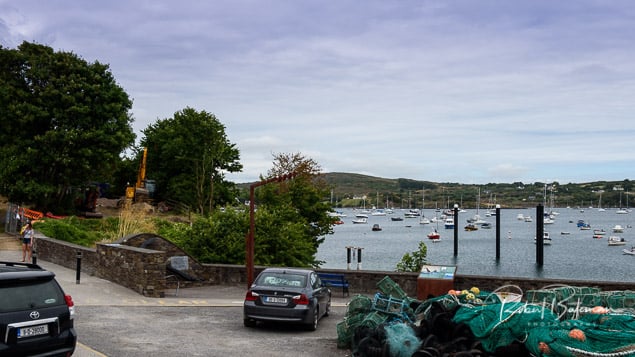 The safe and surprisingly sheltered north harbour, is open only to gales from the south, is home to many waterborne activities Photo: Bob Bateman
The safe and surprisingly sheltered north harbour, is open only to gales from the south, is home to many waterborne activities Photo: Bob Bateman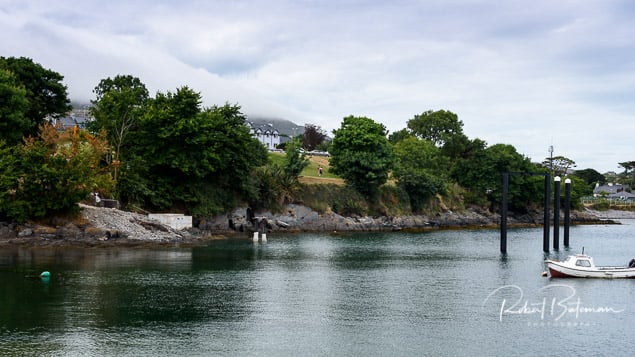
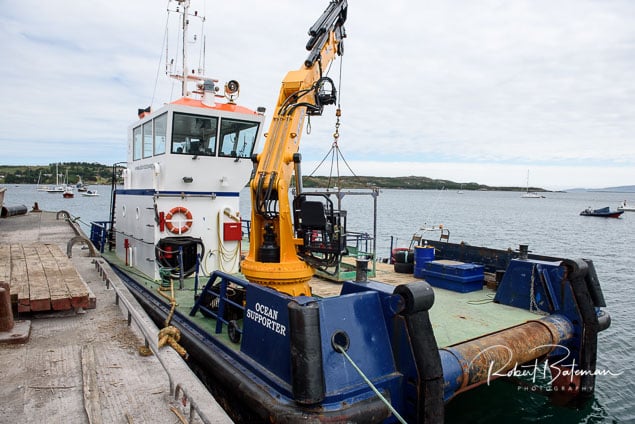 The Ocean Explorer work vessel was involved in the installation of the new Schull Harbour pontoon this month Photo: Bob Bateman
The Ocean Explorer work vessel was involved in the installation of the new Schull Harbour pontoon this month Photo: Bob Bateman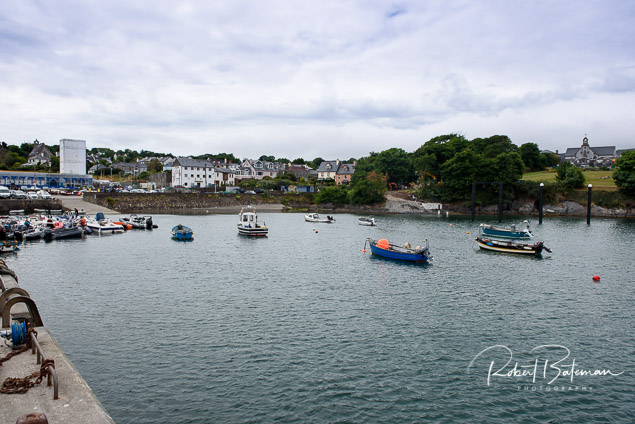
Schull Harbour Pontoon Installation in West Cork Begins
The long-awaited pontoon at the popular boating harbour in Schull, West Cork looks to be finally underway with the arrival, this week, of a jack-up rig for pile driving.
As Afloat.ie reported in April, the Department of the Marine gave €112,500 for the installation of the pontoon which the local community has already procured at Schull in West Cork.
According to Schull Harbour Sailing Club, the contract for the North Harbour pontoon was expected to take six weeks to complete, but due to favourable weather the contractor L&M Keating are expecting to have it completed for Calves Week in early August.
Other West Cork locations also got funding for improvements - €56,250 for Glengarriff Pier to upgrade and improve the existing pier, including new steel steps and safety rails.
Work has also recently been completed to new boating facilities at Cape Clear Island, as Afloat.ie reported here.
As our picture above shows the new Schull facility will be a welcome addition in the popular harbour for both commercial and leisure craft. It's another valuable asset for boaters exploring the sailing wonders of West Cork.


























